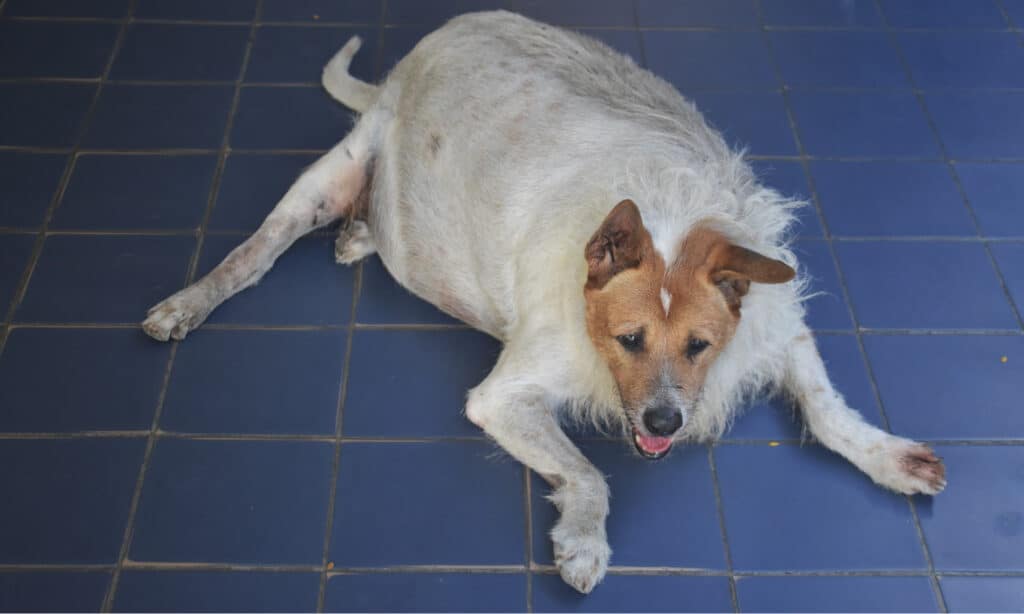We all love our furry friends, and as pet owners, we want the best for them. However, sometimes our love and affection can lead to overindulging our dogs with treats, snacks, and extra meals. Unfortunately, this can contribute to a growing problem that affects millions of dogs around the world: canine obesity.
Canine obesity is a serious health concern that can lead to a range of health problems, from joint pain to diabetes and heart disease. As responsible pet owners, it’s up to us to learn about the causes and risks of canine obesity, and take steps to prevent or manage it. In this blog, we’ll explore the main causes of canine obesity, the potential health risks, and effective strategies for preventing or managing it.

Causes of Canine Obesity
There are several factors that can contribute to canine obesity, and it’s important for pet owners to understand them in order to prevent or manage this health concern. Overfeeding, lack of exercise, and genetics are all potential causes of canine obesity. Additionally, certain breeds and age ranges may be more prone to obesity than others. By understanding these causes, pet owners can take steps to keep their furry friends at a healthy weight and prevent the onset of health problems. In this section, we’ll delve deeper into the main causes of canine obesity and explore strategies for preventing it.
Overfeeding: How to Control Your Dog’s Portion Sizes
Overfeeding is one of the main causes of canine obesity. It’s easy to fall into the trap of overfeeding our furry friends, especially when they give us those irresistible puppy eyes or beg for more treats. However, giving your dog too much food can have serious consequences for their health. To prevent overfeeding, it’s important to control your dog’s portion sizes. This means measuring out their food carefully and avoiding the temptation to give them extra portions or scraps from the table. Your veterinarian can provide guidance on how much to feed your dog based on their breed, age, and activity level. By controlling your dog’s portion sizes, you can help them maintain a healthy weight and avoid the risks of obesity.
Exercise: Making Sure Your Dog Gets Enough Physical Activity
Exercise is essential for maintaining a healthy weight in dogs. It’s important to make sure your furry friend gets enough physical activity on a regular basis. Different dogs have different exercise needs, depending on their breed, age, and health status. Some dogs may need several hours of exercise per day, while others may only need a short walk. The key is to find a routine that works for you and your dog, and to stick to it consistently. Some fun ways to incorporate exercise into your dog’s routine include playing fetch, going for walks or runs, and participating in dog sports like agility or flyball. Regular exercise not only helps with weight management, but it also promotes good mental health and can strengthen the bond between you and your dog.

Genetics: Understanding How Breed and Age Affect Your Dog’s Weight
Genetics can play a role in canine obesity. Some dog breeds are more prone to weight gain than others, and certain age ranges may also be more susceptible to obesity. For example, older dogs may have a slower metabolism and be less active, which can make it easier for them to gain weight. Additionally, some breeds are genetically predisposed to weight gain, such as Labrador Retrievers and Beagles.
If you have a dog that is at a higher risk for obesity due to genetics, it’s important to be extra vigilant about their diet and exercise routine. Your veterinarian can help you determine if your dog is at a higher risk for obesity and provide guidance on how to manage their weight effectively. By understanding how genetics can affect your dog’s weight, you can take steps to prevent or manage obesity and ensure a long and healthy life for your furry friend.

Health Risks of Canine Obesity
Canine obesity is not just a cosmetic concern – it can have serious health consequences for your furry friend. Extra weight can put pressure on your dog’s joints, leading to joint pain and arthritis. It can also increase the risk of developing diabetes and heart disease. Additionally, obese dogs may have a shorter lifespan and a lower quality of life. As a pet owner, it’s important to understand the potential health risks of canine obesity and take steps to prevent or manage it. In this section, we’ll explore the main health risks of canine obesity in more detail and provide guidance on how to keep your dog healthy and happy.
Joint Problems: Understanding How Extra Weight Puts Pressure on Your Dog’s Joints
Extra weight can put pressure on your dog’s joints, which can lead to joint pain, arthritis, and other mobility issues. This is especially true for older dogs or dogs with pre-existing joint conditions. As your dog gains weight, their joints have to work harder to support their body, which can cause wear and tear on the cartilage and lead to joint damage. In severe cases, joint problems can limit your dog’s mobility and quality of life.
To prevent joint problems, it’s important to keep your dog at a healthy weight and provide them with regular exercise to keep their joints strong and flexible. If your dog is already experiencing joint pain or mobility issues, your veterinarian can provide guidance on how to manage their condition and improve their quality of life. By taking steps to prevent joint problems, you can ensure that your furry friend stays healthy, active, and happy for years to come.

Diabetes: The Link Between Obesity and Canine Diabetes
Just like humans, dogs can also suffer from diabetes, a chronic condition that can cause a range of health problems. Canine obesity is a major risk factor for developing diabetes, as overweight dogs have to work harder to produce insulin, which regulates blood sugar levels. This can lead to insulin resistance, where the body is unable to use insulin effectively, resulting in elevated blood sugar levels. Over time, this can cause a range of health complications, such as infections and damage to the eyes, kidneys, and nervous system.
To prevent diabetes, it’s important to keep your dog at a healthy weight and provide them with regular exercise. If your dog has already been diagnosed with diabetes, your veterinarian can provide guidance on how to manage their condition and prevent further health problems. By understanding the link between obesity and diabetes, pet owners can take steps to keep their pups healthy and happy for years to come.
Heart Disease: How Obesity Puts Your Dog’s Heart Health at Risk
Just like in humans, obesity can increase the risk of heart disease in dogs. When a dog is carrying extra weight, their heart has to work harder to pump blood throughout their body, which can cause long-term damage to the heart muscle. Moreover, obesity can cause fatty deposits to accumulate in the arteries, potentially leading to blockages that increase the risk of heart attacks and other cardiovascular problems. Dogs with heart disease may exhibit symptoms like coughing, shortness of breath, and fatigue. To reduce the risk of heart disease, it’s essential to keep your dog at a healthy weight and ensure they get regular exercise. If your dog has already been diagnosed with heart disease, your veterinarian can guide you on how to manage their condition and prevent further complications.

Prevention and Management of Canine Obesity
Keeping your furry friend at a healthy weight involves much more than simply restricting their food intake. It requires a comprehensive approach that takes into account diet, exercise, and overall lifestyle factors. By being proactive about your dog’s weight, you can reduce the risk of health problems and ensure that they lead a happy and fulfilling life. In this section, we’ll explore various effective strategies for preventing and managing canine obesity. We’ll cover everything from creating a healthy diet plan and incorporating exercise into your dog’s routine, to rewarding them with healthy treats. By taking a holistic approach to your dog’s health, you can help them maintain a healthy weight and enjoy a long and happy life by your side.
Creating a Healthy Diet Plan for Your Dog: Balancing Nutrients and Calories
A healthy diet is crucial for maintaining a healthy weight in dogs. When creating a diet plan for your furry friend, it’s important to strike a balance between nutrients and calories. Your dog’s diet should provide all the necessary nutrients, vitamins, and minerals to keep them healthy, but also limit the number of calories to prevent excess weight gain. High-quality dog food brands can provide a good foundation for your dog’s diet, but it’s also important to consider your dog’s individual needs and adjust their food intake accordingly.
Factors such as breed, age, and activity level can all influence how much and what type of food your dog needs. Your veterinarian can help you create a personalized diet plan for your dog and recommend the right type and amount of food to help them maintain a healthy weight. By creating a healthy diet plan for your furry friend, you can help them achieve and maintain a healthy weight and reduce the risk of obesity-related health problems.

Exercise for Dogs: Tips and Tricks for Keeping Your Pup Active
Exercise is essential for maintaining a healthy weight in dogs. However, it can sometimes be challenging to keep your pup active, especially if you have a busy schedule or live in a small space. Fortunately, there are many fun and creative ways to incorporate exercise into your dog’s routine. Simple activities like going for walks or playing fetch in the backyard can provide much-needed exercise for your furry friend. Other fun ideas include taking your dog on hikes, swimming, or playing with puzzle toys that encourage physical activity.
It’s important to find activities that your dog enjoys and that fit into your lifestyle. Consistency is key, so aim for regular exercise sessions throughout the week. Your veterinarian can provide guidance on how much exercise your dog needs based on their breed, age, and health status. By making exercise a priority in your dog’s life, you can help them maintain a healthy weight and improve their overall physical and mental well-being.
Incorporating Healthy Treats: Rewarding Your Dog Without Overfeeding
Treats are a great way to reward your dog for good behavior and show them some love. However, it’s important to choose treats that are both delicious and healthy, so you don’t inadvertently contribute to your dog’s weight gain. Look for treats that are low in calories and made from high-quality ingredients, such as lean proteins, fruits, and vegetables. Avoid treats that are high in fat or sugar, or that contain fillers and artificial preservatives. You can also consider making your own homemade treats using healthy ingredients like peanut butter or pumpkin puree. When it comes to portion control, it’s best to stick to small, bite-sized treats and limit the number you give your dog each day. By incorporating healthy treats into your dog’s diet, you can reward them without overfeeding and help them maintain a healthy weight.

Conclusion
Canine obesity is a serious health concern that can impact your dog’s quality of life and increase the risk of a range of health problems. However, with the right strategies in place, it’s possible to prevent and manage obesity in your furry friend. By creating a healthy diet plan, incorporating regular exercise into their routine, and rewarding them with healthy treats, you can help your dog maintain a healthy weight and enjoy a happy, active life. Remember, every dog is different, and what works for one dog may not work for another. It’s important to work closely with your veterinarian to create a customized plan that meets your dog’s unique needs. With patience, dedication, and a commitment to your dog’s health and well-being, you can help them achieve and maintain a healthy weight and enjoy a long and happy life by your side.
~Lindsie
